
The world’s need for electricity keeps growing. Businesses today rely on a steady, clean power supply more than ever. Think about factories, big stores, or even your local office building. They all need reliable energy to run well. As we use more green energy sources, like solar panels and wind turbines, a big question comes up: how do we keep power flowing when the sun isn’t shining or the wind stops?
This is where commercial battery energy storage systems (BESS) step in. Simply put, these systems are large batteries for businesses. They store extra electricity when it’s cheap or when renewable sources are making a lot of power. Then, they release that power when the business needs it most, or when grid electricity gets expensive. These systems work with traditional power, making the whole system stronger.
This guide will walk you through everything about commercial BESS. You will learn what makes them tick, how they help businesses save money, and where they are used. We’ll also look at what to think about before getting one, and what the future holds for this important technology.
To really get how a commercial battery system works, you need to know its main parts. It’s more than just a big battery. Many smart pieces work together to store and deliver power safely and well. These parts ensure the system runs smoothly every day.
The type of battery inside the system matters a lot. Each kind has its own strengths and weaknesses. Choosing the right one depends on what the business needs.
• Lithium-ion Batteries: These are the most common choice for commercial use. Why? They pack a lot of power into a small space. They also last a long time, often many years. Costs for these batteries have dropped quite a bit lately, making them a top pick. Two main types are popular: LFP (Lithium Iron Phosphate) and NMC (Nickel Manganese Cobalt). LFP batteries are known for being very safe and having a long cycle life. NMC batteries offer higher energy density, meaning they can store more power in the same size.
• Other Chemistries: While lithium-ion leads, other battery types are gaining notice. Flow batteries, like Vanadium Redox Flow, store energy in liquid tanks. They are great for very long periods of storage, sometimes for many hours. They may not be as compact as lithium-ion, but they can be a good fit for certain long-duration needs. New chemistries are always being researched too.
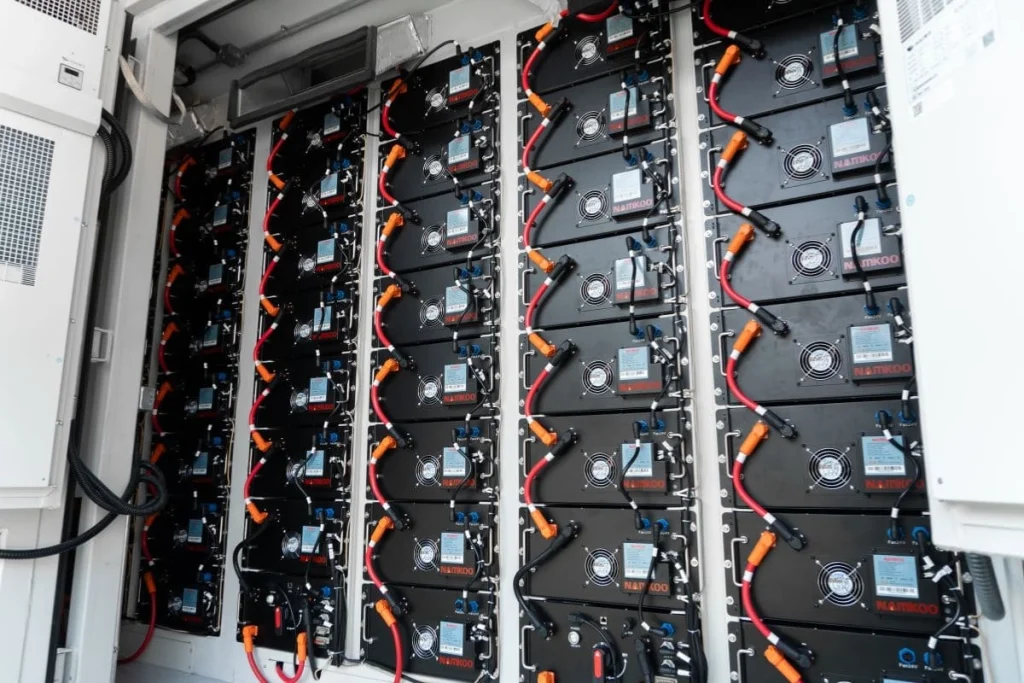
Batteries can’t work alone. They need a team of other parts to make sure they run safely and give power just right. These helper components are super important. They keep everything in check.
• Inverters and Converters: Imagine electricity flowing like water. Batteries store power as DC (direct current). But your building and the grid use AC (alternating current). Inverters change the DC power from the battery into AC power your building can use. They also do the opposite, turning AC power from the grid into DC to charge the battery. These devices are key for managing power flow.
• Battery Management System (BMS): This is like the brain of the battery system. The BMS constantly watches each battery cell. It checks things like how much charge is left and the temperature. It keeps batteries from getting too full or too empty. This protects the batteries, making them last longer and keeping everyone safe. A good BMS is truly vital for long-term health.
• Thermal Management Systems: Batteries work best within a certain temperature range. If they get too hot or too cold, they don’t last as long and might even be unsafe. Thermal systems, like cooling fans or heaters, keep the battery at its ideal temperature. This makes sure the batteries give their best power for many years.
Getting a BESS to work with your building and the wider electricity grid needs smart hook-ups. These systems make sure the battery knows what to do and when to do it. It’s all about smart communication.
• Grid Interconnection: Connecting a BESS to the main power grid involves following strict rules. These rules make sure the system is safe for workers and for the grid itself. Proper hook-ups prevent problems and keep the power flowing smoothly. Local utilities have specific guidelines for this step.
• Energy Management Software (EMS): This software is the master planner. It tells the BESS when to charge up and when to let power out. The EMS looks at many things. It checks how much power your business is using. It also watches electricity prices, charging more when power is cheap. The EMS makes sure the BESS always works in the smartest way to save money.
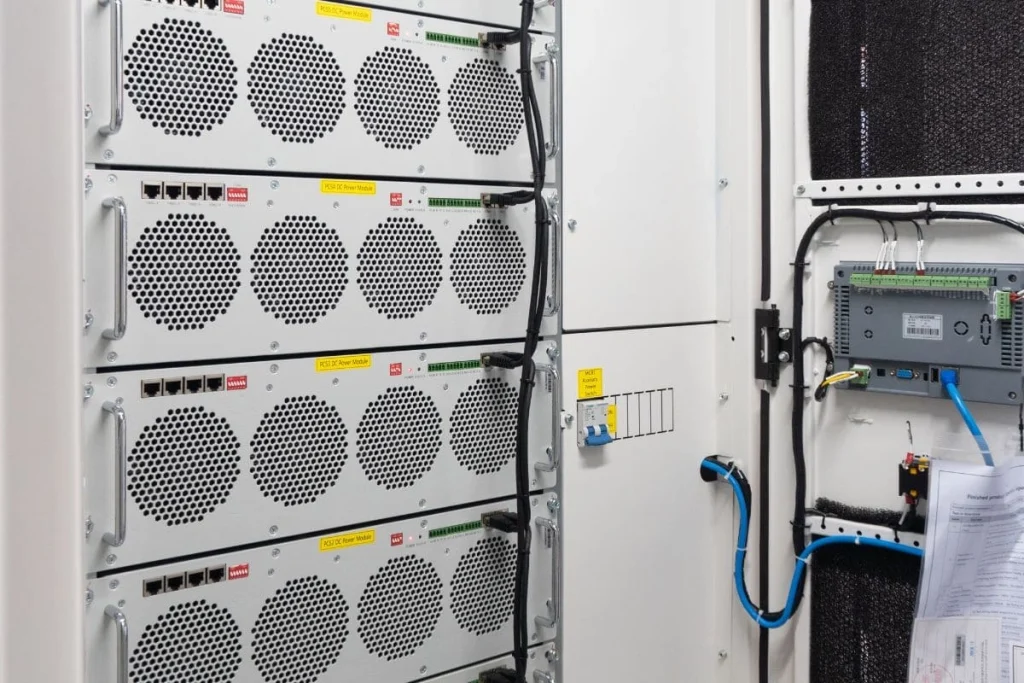
Businesses that use BESS find many good things come from it. These systems are not just about being green. They offer real, clear benefits that help the bottom line and keep operations running. Let’s look at some big wins.
A stable power grid is a strong grid. Commercial BESS can act like shock absorbers for the electricity system. They help make sure power is always there, even when things get tricky.
• Peak Shaving and Load Leveling: Imagine your electricity bill jumps up when you use a lot of power at one time. This is called a demand charge. BESS helps by using stored power during these busy times. It lowers the amount of power you pull from the grid. This smooths out your energy use and cuts those high demand charges. It’s like having your own power reserve.
• Ancillary Services: BESS can do more than just power your building. They can also help the main grid. For example, they can quickly add or remove power to keep the grid’s frequency steady. This service helps the grid operator keep things running well. Sometimes, businesses can even earn money for providing these critical services.
• Backup Power and Resilience: What happens if the power goes out? For many businesses, even a short outage can mean big losses. A BESS can instantly switch on and give your building power. It keeps important machines running and lights on. This makes your business much tougher against power cuts.
Money talks, and BESS systems offer clear financial gains. Businesses can see real savings on their energy bills. They can also create new ways to earn cash.
• Reduced Electricity Costs: The biggest financial benefit often comes from cutting electricity bills. By using stored energy during peak times, businesses avoid buying expensive power from the grid. They can also charge batteries when power is cheap (like at night) and use it when power is costly (like during the day). This is called time-of-use arbitrage.
• Revenue Generation: Beyond saving money, BESS can help businesses make money. How? By joining demand response programs. In these programs, the utility pays you to reduce your power use when the grid is stressed. Also, as mentioned, providing ancillary services can bring in extra cash.
• Potential for Energy Independence: Pair a BESS with solar panels on your roof, and you start to become your own power plant. This means less reliance on the grid. You get more control over your energy costs. This helps protect your business from sudden price hikes or power problems.
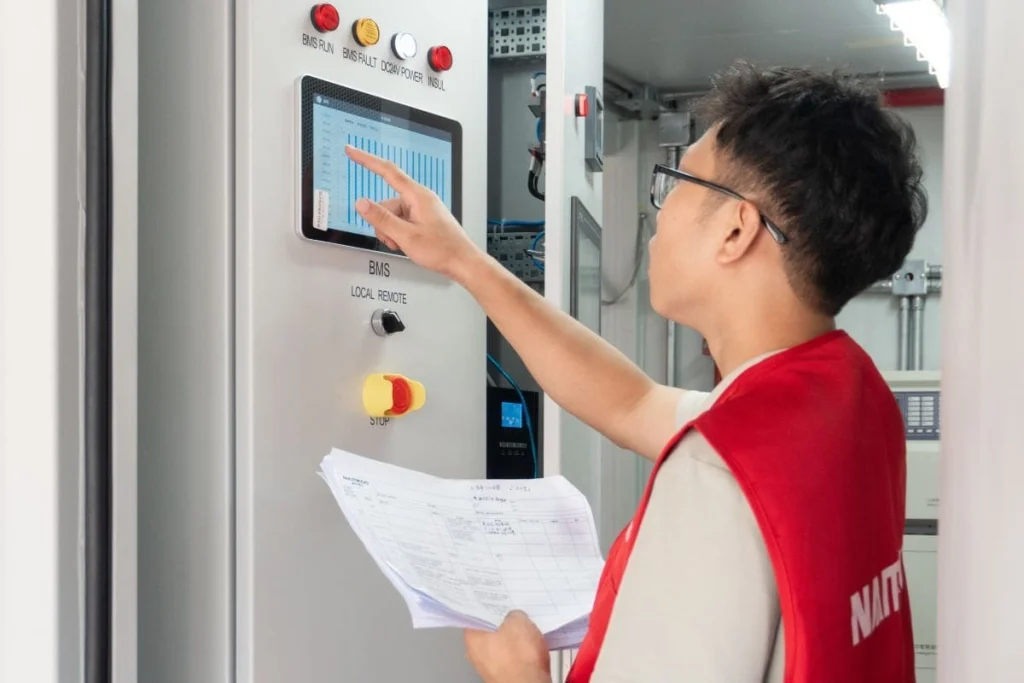
Renewable energy is the future, but it has one challenge: it’s not always on. The sun doesn’t shine at night, and the wind doesn’t always blow. BESS solves this problem beautifully.
• Smoothing Renewable Output: When solar panels make too much power, a BESS can store that extra energy. When the panels aren’t making enough, the BESS releases the stored power. This makes renewable energy sources much more reliable. It ensures a constant stream of clean power, day or night.
• Increasing Renewable Penetration: With storage, grids can handle more solar and wind power. Without it, too much renewable energy could make the grid unstable. BESS acts as a buffer. It allows more clean energy to be added to the grid without causing problems. This is key for a greener energy future.
Commercial battery storage isn’t just for one type of business. Many different industries can benefit from these systems. Each finds unique ways to use BESS to their advantage.
These businesses often use a lot of power. They have big machines that can cause huge spikes in electricity demand. BESS is a perfect fit here.
• Demand Charge Management: Manufacturing plants often run heavy machinery. This can lead to very high electricity demand at certain times, which means big demand charges on their bills. BESS can step in to provide power during these high-use periods. This lowers the peak demand a business pulls from the grid. It saves them a lot of money.
• Uninterruptible Power Supply (UPS) for Critical Processes: Imagine a car assembly line stopping because of a power flicker. This can be very costly. BESS can act like a giant UPS system. It provides instant backup power. This keeps critical production lines and sensitive equipment running smoothly. It prevents expensive downtime.
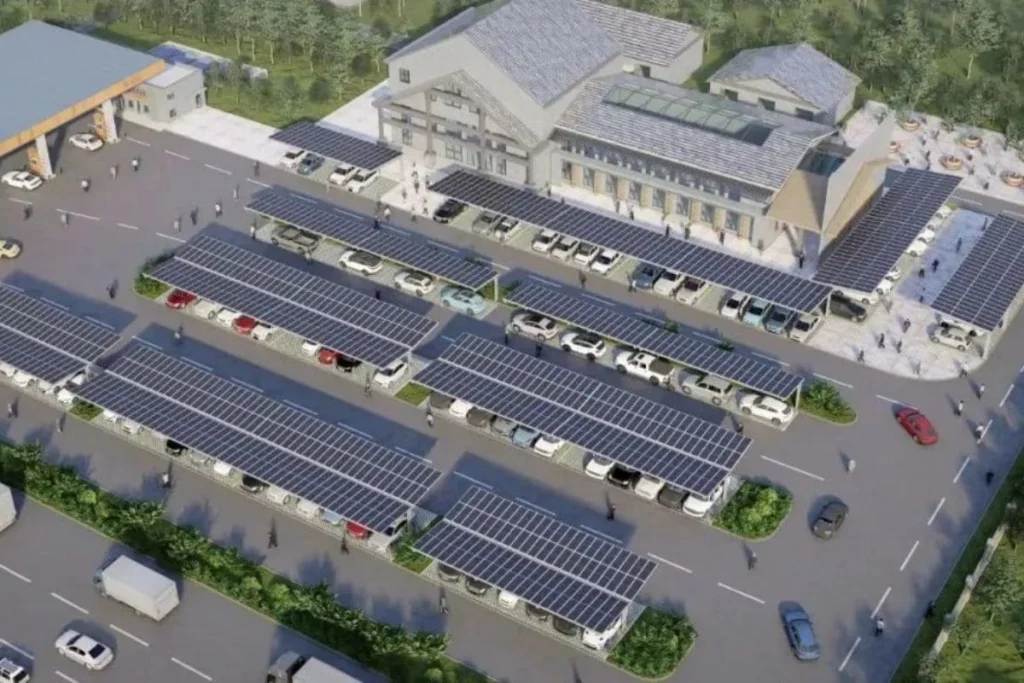
From shopping malls to office complexes, these buildings have different energy needs throughout the day. BESS helps manage these shifts.
• HVAC Load Management: Heating, Ventilation, and Air Conditioning (HVAC) uses a lot of power. This is especially true during hot summer afternoons. BESS can power HVAC systems during these peak times. This stops the building from pulling expensive electricity from the grid. It shifts energy use to cheaper, off-peak hours.
• Electric Vehicle (EV) Charging Integration: Many businesses now offer EV charging for customers or their own fleets. Fast EV chargers can put a big strain on the grid connection. BESS can store energy and then release it to support EV charging. This reduces the direct impact on the grid. It allows more chargers without needing costly grid upgrades.
These places need power all the time, no matter what. Uptime is everything for them. BESS provides extra layers of safety.
• Enhanced Redundancy and Uptime: Data centers cannot go down. Every second of outage can mean huge financial losses and broken trust. BESS works with existing backup systems like generators and traditional UPS. It gives an extra layer of power protection. This ensures near-perfect uptime.
• Grid Services and Capacity Firming: Data centers are massive power users. Some can use BESS to help the grid when needed. They can provide services like frequency regulation. This helps them ensure a very stable power supply for their own operations. It also helps the wider grid.

Thinking about getting a BESS for your business? Great! But there are some important things to consider first. Careful planning makes all the difference.
You wouldn’t buy a car without knowing where you’ll drive it. The same goes for BESS. You need to know your energy needs.
• Load Profiling and Energy Consumption Analysis: Look at your past electricity bills. How much power do you use? When do you use the most? Understanding your business’s energy habits is the first step. This helps show how a BESS can best save you money.
• Determining Optimal System Capacity: How big should your BESS be? It depends on your goals. Do you want to cut peak demand? Or keep critical systems running for hours during an outage? Experts can help figure out the right size of battery storage. They match it to your energy needs and budget.
Governments want more clean energy. This means money might be available to help you buy a BESS. It pays to check what’s out there.
• Federal, State, and Local Incentives: Many places offer tax credits, grants, or rebates for installing BESS. These can lower the upfront cost a lot. Make sure to research what programs are available where your business is located. These incentives change often.
• Interconnection Standards and Permitting: Connecting a BESS to the utility grid means getting permission. There are specific technical rules and safety checks. Your business will need permits. Working with experienced installers helps navigate these steps.
Is a BESS a good investment? You need to crunch the numbers. It’s smart to know how long it will take to get your money back.
• Calculating Payback Periods and Return on Investment (ROI): How quickly will the system pay for itself through savings? This is the payback period. ROI shows the overall profit from the investment. You will want to calculate these to see the long-term money benefits.
• Financing Options: You don’t always have to buy a BESS outright. There are other ways to pay. Some companies offer Power Purchase Agreements (PPAs). Here, you only pay for the stored energy you use. Leasing is another choice. Explore these options to find what fits your budget.
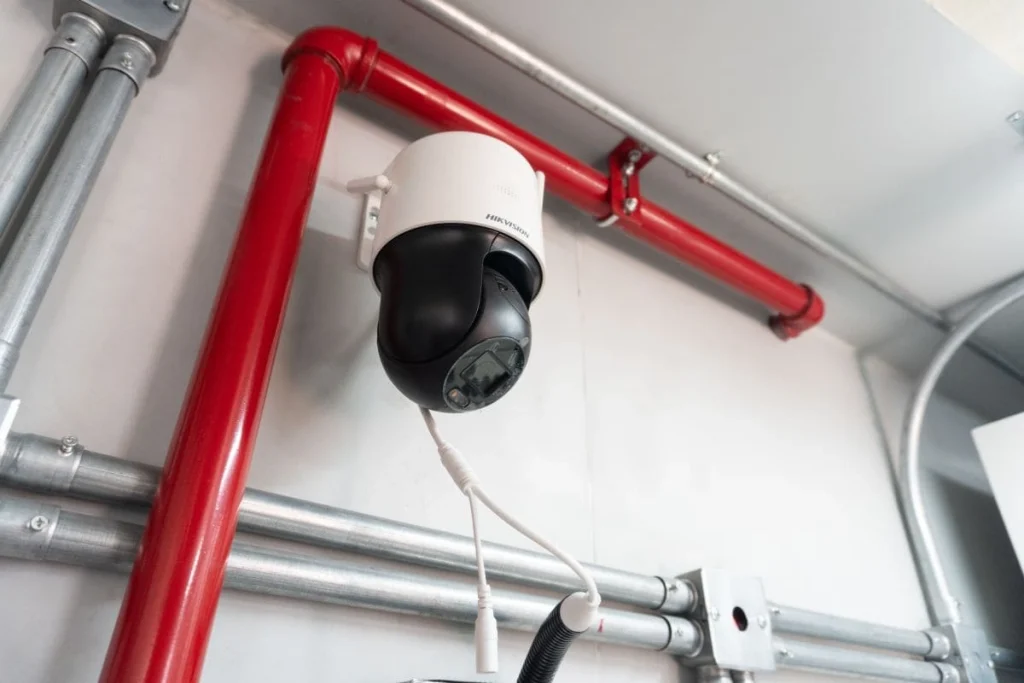
The world of energy storage is always moving forward. What’s new and exciting coming down the road? Expect even better batteries and smarter ways to use them.
Innovations keep making batteries better and cheaper. New types of batteries are being developed.
• Solid-State Batteries and Advanced Chemistries: New battery designs could offer even more power and be safer. Solid-state batteries, for example, don’t use liquid electrolytes. This might make them more stable and able to store more energy. Other new chemistries are also being explored.
• Long-Duration Energy Storage: Most current BESS systems store power for a few hours. But what if you need power for a full day or longer? New technologies are being built for these longer storage needs. This will help make the grid even more reliable.
• Vehicle-to-Grid (V2G) Technology: Imagine your company’s fleet of electric vehicles. When not in use, these EVs could send power back to the grid. This makes them moving energy storage units. V2G technology could turn a fleet into a valuable energy asset.
Rules and markets are changing to support more energy storage. This creates new chances for businesses.
• Grid Modernization Initiatives: Power companies are investing in making the grid smarter. These upgrades make it easier to add BESS systems. A modern grid can better handle power from many different sources.
• Carbon Pricing and Sustainability Goals: Many governments are putting a price on carbon pollution. This makes clean energy solutions like BESS more attractive. Businesses also have their own goals to be more green. BESS helps them meet these goals.
Commercial battery energy storage systems are much more than just big batteries. They are key to a stronger, greener way to power your business. They help cut costs, make your operations safer from power cuts, and support clean energy use.
These systems are not just a nice-to-have. They are becoming a must-have for modern companies. A BESS gives you control over your energy. It makes your business ready for whatever comes next.
Think about how a BESS could change your energy use. It’s a smart choice for a more efficient, tough, and sustainable future. Investing in battery storage can truly power your business for years to come.
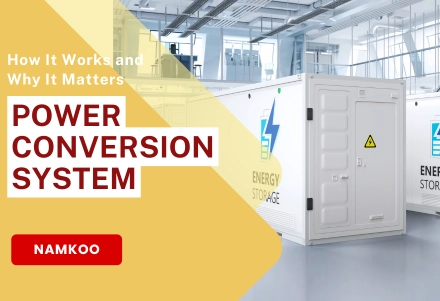
Power Conversion System convert energy between storage and grids. Learn key principles, peak-shaving applications, and how Namkoo systems cut energy costs.


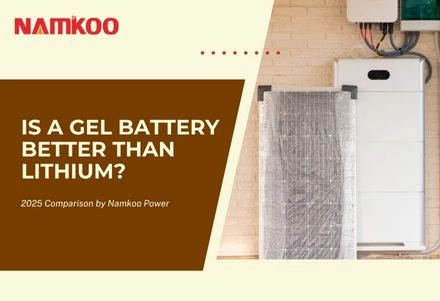
Compare gel and lithium batteries in 2025 with Namkoo Power. Learn which battery offers better performance, lifespan, and value for your solar system.



Discover the hidden risks of Home Solar Power Systems and how to stay safe. Learn expert tips from Namkoo and explore safe residential solar solutions.



No.26-2,1st Floor, Kuiqi Road West Extension, Nanzhuang Town,Chancheng District,Foshan City,Guangdong Province, China (528000)
Contact Number: +86 18826309307
Email: [email protected]